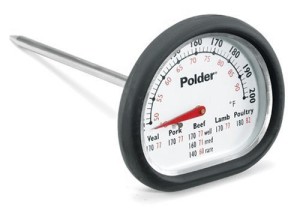
With Christmas a week away, I thought we’d better discuss proper food safety practices. My mom likes to call me the “food police” because I’m always asking her about her cooking and food holding practices, checking out the fridge, and making sure the hot food stays hot and cold foods stay cold. I know it may seem a little OCD on my part, but the reality is, the holidays usually involve all day eating or grazing for several hours and if someone isn’t watching the temps or being mindful of the proper food safety practices, bacteria can develop in your food and food borne illness would put a major damper on your celebrations! Below are some tips to help you practice proper food safety so that you and your family can enjoy the festivities and stay healthy!
Wash: wash your hands in warm, soapy water for at least 20 seconds before, during, and after food preparation. Anyone who is helping with the food prep, should practice this! Keep your kitchen surfaces and cutting boards clean and sanitized (use one cutting board for meats and another for the ready to eat foods such as veggies). Be sure to use separate serving utensils for cooking and serving as well.
Thaw Properly: the best way to thaw is in the fridge, so be sure to put the big turkey or roast in the fridge several days before you plan to cook it to allow for ample time to unthaw. Be sure to place the meat in the bottom shelf of the fridge so the juices don’t drip on other foods. You can unthaw/defrost in the microwave, but if you do this, it needs to be cooked immediately. Another option is to fill the sink with cold tap water and place the wrapped meat in the water. If you choose this method of unthawing, be sure to change the water every 30 minutes.
Check your Temps: the only way to determine if the meat is at the proper temperature is to use a meat thermometer. Color, smell, appearence, etc are not reliable measures to make sure your meat is done properly. Whole turkeys should be cooked to 165°F, roasts should be cooked to 160°F, hams and pork roasts should be cooked to 145°F. When using a thermometer, stick it in the thickest part of meat and make sure it’s not touching the pan, bones, or fat.
Practice Proper Holding: after two hours of having food out, bacteria can rapidly multiply on perishable items. If you want your food to stay out for longer than that, you may consider using a crock pot or keeping the hot food in the oven to keep it hot and using ice packs or keeping the cold foods in the fridge. The basics is that we want to keep “cold food cold, and hot food hot” to prevent bacteria from growing. Be sure to check the temps before eating if you have been holding the food for hours.
Leftovers: reheat your leftovers to 165°F and bring gravy to a steady boil on the stove before serving it again. Refridgerated cooked turkey should be using with in 3-4 days and stuffing within 1-2 days. Casseroles and cooked veggies should be used with in 3-4 days. When in doubt, throw it out! Yes, this is hard to do, but the longer it sits, the more risky it is!
Most of all, just be mindful and use your common sense when preparing and handling foods and be sure to cherish what the holidays really are about!
-Kelsey

